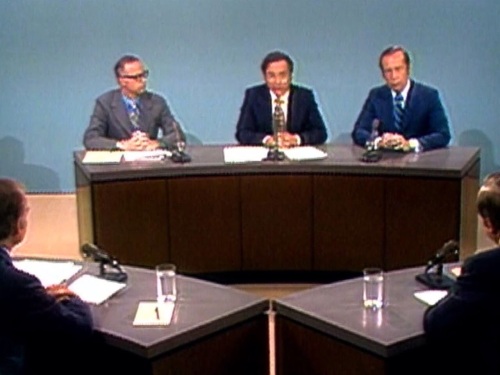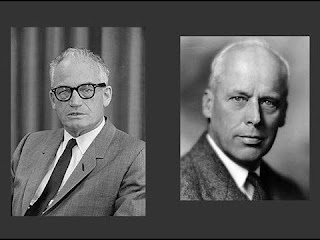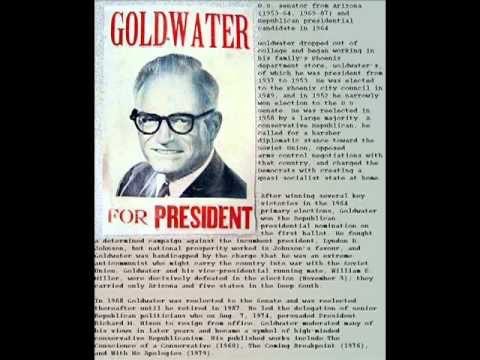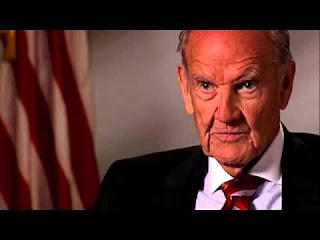
Source:Richard Nixon Library– Former U.S. Senator and 1972 Democratic Party presidential nominee George McGovern, talking to presidential historian Tim Naftali, in 2009.
Source:FreeState MD
“George McGovern recorded interview by Timothy Naftali, 26 August 2009, the Richard
Nixon Oral History Project of the Richard Nixon Presidential Library and Museum.”
From the Richard Nixon Library
“George Stanley McGovern, who rose from small-town roots in Avon and Mitchell to the highest heights of American politics, died Sunday morning at a Sioux Falls hospice facility from a combination of medical conditions associated with his age. He was 90.
Though he was known mostly for his unsuccessful 1972 presidential campaign, McGovern was more than that. He was an accomplished student and debater during his school days in Mitchell; a World War II bomber pilot decorated with the Distinguished Flying Cross; a doctorate-level scholar; a history professor; the rebuilder of the South Dakota Democratic Party; a U.S. representative; director of the Food for Peace program in the Kennedy administration; a U.S. senator; an icon of the anti-Vietnam War effort; a lifelong crusader against the scourge of hunger; a United Nations delegate and ambassador; the author of 14 books; and, in his later years, an elder statesman who remained a sought-after speaker and commenter on issues of the day.”
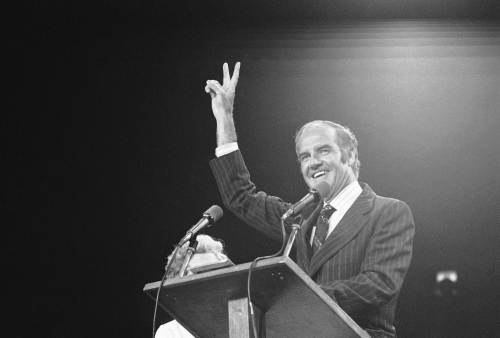
Source:The Mitchell Republic– U.S. Senator George McGovern (Democrat, South Dakota) running for President in 1972.
“Sen. George McGovern gives the victory sign to throng of about 20,000 persons assembled at Madison Square garden, June 14, 1972 in New York for rally in support to his attempt to win the democratic presidential candidacy. (AP Photo/Dave Pickoff)”
From The Mitchell Republic
George McGovern was someone with one hell of a political and professional resume, who represented South Dakota in both the U.S. House and U.S. Senate as a Leftist Democrat in one of the reddest states in the union. And yet he represented South Dakota in Congress for twenty-two years.
Mr. McGovern served as Director of the U.S. Food For Peace Program, who won the Democratic Party nomination for President in 1972, who rebuilt the Democratic Party almost on his own, by bringing in so many new Democrats, who thought the Democratic Party was still the Dixiecrat Party that didn’t welcome ethnic or racial minorities or women, and so-forth.
Senator McGovern benefited the Democratic Party by 1976 with Jimmy Carter being elected President in 1976, who was a Progressive Democrat from the South and not as far to the left as the national Democratic Party. George McGovern was a man who truly believed in public service, that it was about representing the public and not furthering your career financially.
George McGovern grew up in the New Deal era in the Democratic Party era, the Progressive Era of Franklin Roosevelt and thought this was the politics of the future. And something that he believed in and was the dominant political philosophy up until the late 1960s or so.
The problem that Senator McGovern had was that by the time he was a national Democrat and becoming a major contender For President of the United States, Senator McGovern was not a New Deal Progressive Democrat, but more of a Henry Wallace Democratic Socialist, during a time when the country was moving to the right on economic policy and when high taxes, Welfare, big government were becoming unpopular.Yet
When the country was moving right economically, the George McGovern and the Democratic Party was moving left, thanks to the New-Left and Baby Boomers of the 1960s and 70s. Which made it almost impossible for a McGovernite like a McGovern to win nationally and win statewide perhaps in most states.
The main difference between Barry Goldwater and George McGovern’s landslide presidential losses, is that Senator Goldwater was ahead of his time and the country wasn’t quite ready for his let’s call it conservative-libertarianism in 1964. At the heart of the Great Society era in the country.
But in Senator McGovern’s case, the country moved past his and LBJ’s progressivism and Wallace/McGovern democratic socialism. And instead we’re looking for fewer taxes and more economic development and growth in America.
What I call the McGovern wing of the Democratic Party, that’s different from the FDR or LBJ wing, was forming, but hasn’t had the power to nominate another McGovern Socialist to run for President in the Democratic Party.
The Far-Left of the Democratic Party tried with McGovern again in 1984, Jesse Jackson in 84 and 88, Dennis Kucinich in 2004 and 2008. But none of these Far-Leftist Democrats, have come even close to being a major contender for the Democratic presidential nomination. And we are now seeing McGovern-Democrats running for President in social democratic third-parties.
George McGovern’s legacy for the Democratic Party, is that he expanded it. Taken it away from the right-wing Religious-Right of the South and giving the Republican Party a Christmas gift from hell. And turning the Democratic Party into more of a Northern and West Coast party. That relies on minorities and women, to be successful politically.
Read Full Post »
 Source:CNN– Real Time With Bill Maher talking to Canadian talk show host George Stroumboulopoulos.
Source:CNN– Real Time With Bill Maher talking to Canadian talk show host George Stroumboulopoulos.
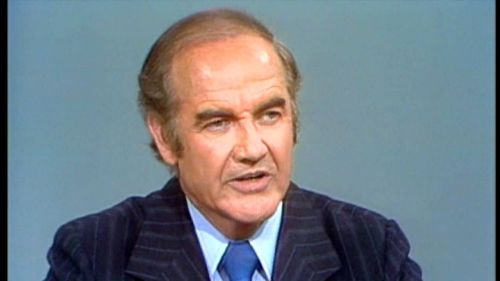 Source:
Source: